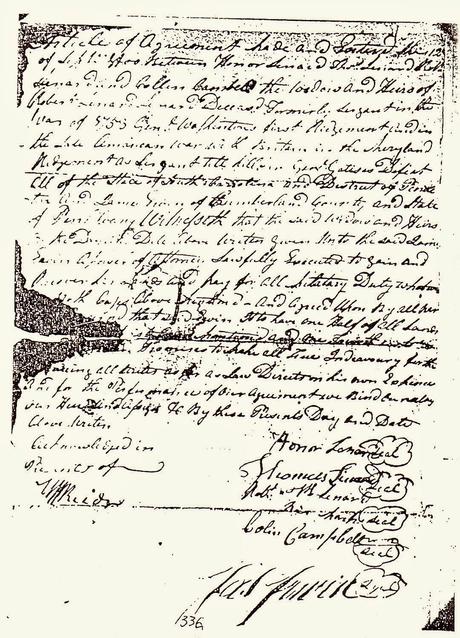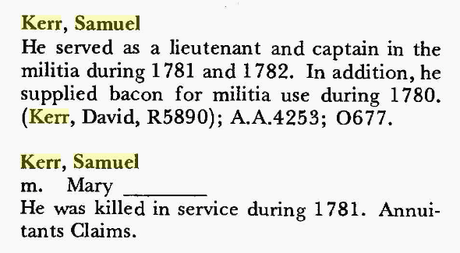
On this day celebrating American independence, I think of two of my direct ancestors who gave their lives for the revolutionary cause — Robert Leonard, who came to America as a British soldier during the French and Indian War, where he helped secure the western Maryland frontier for the British, and who then remained in the colonies following his discharge from the British Army. He was killed as an American soldier at the battle of Camden in South Carolina on 16 August 1780.
A power of attorney given by his widow Honor (Pritchard) Leonard, sons Thomas and Robert, and son-in-law Colin Campbell in 1800 notes his service in the French and Indian conflict, and then states the he died in General Gates's "Defiat" in South Carolina as a sergeant in the Maryland army.

Another of my ancestors, Samuel Kerr, died in May or June 1781 after wounds he received at the siege of Ninety-Six in South Carolina, in which he was a captain of a Revolutionary militia unit. Bobby Gilmer Moss's Roster of South Carolina Patriots in the American Revolution (Baltimore: Geneal. Publ. Co., 1983), from which the snapshot below is taken, erroneously assumes that Samuel was still living in 1782, because a Revolutionary pay indent shows his widow Mary (Calhoun) Kerr receiving payment in that year for bacon Samuel had supplied the Revolutionary troops before his death:

As Moss's abstracts of Samuel's Revolutionary service records indicate, however, South Carolina Annuitants Claims show that he had died by 1781, and the Revolutionary pension of his cousin David Kerr also suggests this.
So why mention these dead men today? Clearly, because they're on my mind this Fourth of July soon after the highest court in the United States has informed us yet again that corporations have souls, that corporations are persons capable of exercising conscience, that corporations can pray and exhibit religious faith and determine the kind of healthcare to be doled out to their employees on the basis of their peculiar religious beliefs.
I am strongly of a mind that my ancestors Robert Leonard and Samuel Kerr did not die to secure the "right" of corporations to posture as religious entities. I strongly suspect that Robert Leonard and Samuel Kerr would be rolling in their graves on this Independence Day, if they could somehow be informed of what the Supreme Court of the United State has just announced.
I'm inclined to believe, on the basis of everything I know about these men and my other 26 great-grandfathers who took part in the American Revolution, that these ancestors of mine supported their nation's independence because they wanted the precise opposite of what the Supreme Court has accomplished in deifying corporations. What this court has chosen to do with Citizens United and Hobby Lobby and several other rulings establishing a bogus doctrine of corporate personhood is a slap in the face to those who gave blood and, in some cases, their lives, for the independence of the American colonies in the 18th century.
The photo is from the Flickr photo stream of Joey Shevelson, by way of Creative Commons.

